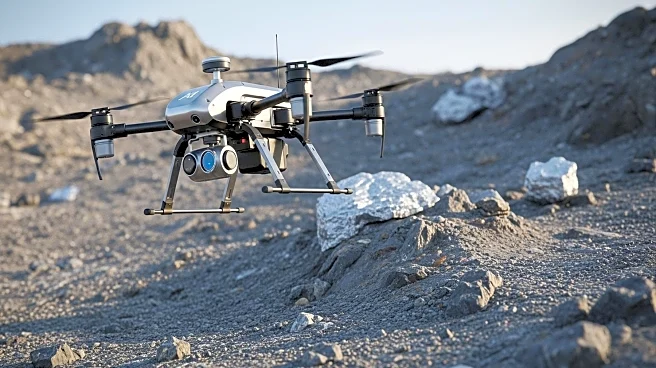What's Happening?
Artificial intelligence (AI) is increasingly being utilized in mineral exploration to improve the speed and accuracy of discovering mineral deposits. As demand for critical minerals like lithium and cobalt rises, AI offers a solution to traditional exploration methods that are often slow and complex. AI systems can analyze large datasets, such as geophysical and chemical information, to identify patterns that might be missed by human analysis, potentially reducing discovery times from years to months. This technology is crucial for the U.S., which is heavily reliant on imports for several critical minerals. AI also aids in supply chain management by tracking minerals from source to product and identifying alternative sources in case of disruptions.
Why It's Important?
The integration of AI in mineral exploration is significant for the U.S. economy and national security. As the country seeks to reduce its dependency on foreign minerals, AI can help revitalize domestic mining and fast-track permits, contributing to mineral independence. The technology not only accelerates discovery but also enhances supply chain transparency, which is vital for meeting environmental, social, and governance standards. Companies that adopt AI can gain a competitive edge by optimizing exploration and extraction processes, thereby reducing costs and environmental impact.
What's Next?
The future of AI in mineral exploration looks promising, with increased venture capital investment and cross-sector partnerships. However, challenges such as data quality limitations and regulatory hurdles remain. The U.S. will need to invest in foundational data gathering and adapt regulatory frameworks to fully leverage AI's potential. As AI continues to evolve, it will likely augment human expertise rather than replace it, requiring ongoing collaboration between data scientists, geologists, and policymakers.
Beyond the Headlines
AI's role in mineral exploration extends beyond discovery to include supply chain management and ethical sourcing. By integrating blockchain technology, AI can enhance transparency and traceability, ensuring compliance with ESG standards. This capability is crucial in a global market where certain minerals are subject to export restrictions, allowing companies to identify alternative supply streams and mitigate risks.









